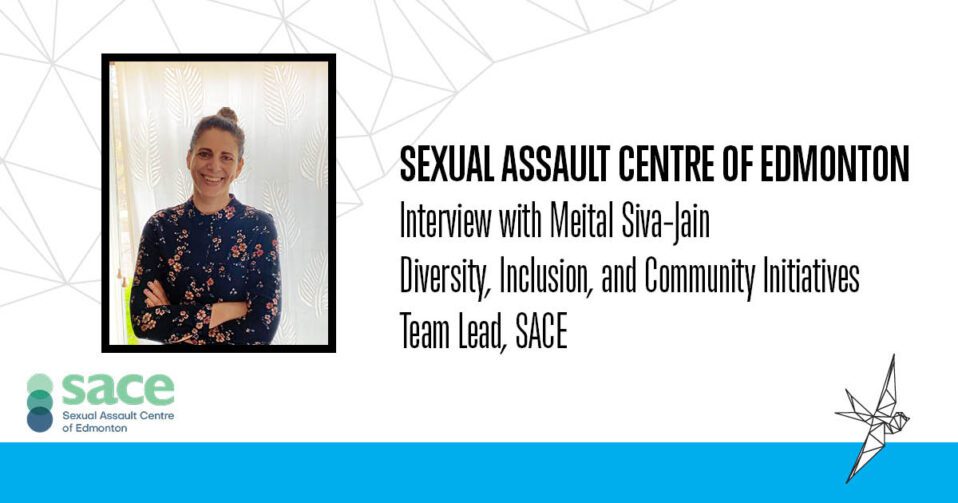This article was originally published in our May 2021 newsletter, themed around “safety.”
This month we want highlight the work being done at the Sexual Assault Centre of Edmonton (SACE). May is Sexual Violence Awareness Month in Alberta, and May 5 the National Day of Awareness for Missing and Murdered Indigenous Women and Girls.
We talked to Meital Siva-Jain, Diversity, Inclusion, and Community Initiatives Team Lead at SACE. Meital shares the programs and resources SACE offers as well as the impact she sees their work having on the community, from youth to older generations.
Tell us about your organization and your role.
The Sexual Assault Centre of Edmonton’s mandate is to support people impacted by sexual violence and to change the attitudes and values that lead to sexual violence. We offer counselling services to ages 3 and up, support and information lines, police and court support, public education, and community and institutional support. We offer these services to all genders and backgrounds at no fee. We also have a Diversity and Inclusion program that works to ensure our services are accessible to anyone that might need to access them.
I joined SACE in 2014 and have been leading the Diversity and Inclusion program since then. Under this role I focus on building relationships with other organizations and community members to address barriers to services. This role has allowed me to learn from community members about how systemic barriers impact their access to support. I also learned that addressing those barriers is often the support that folks need to do their own healing.
One way to address barriers is to offer tailored content and services. Last summer, a group of SACE staff started creating a resource for newcomers in Canada that provides information on consent and healthy relationship in accessible and inclusive language. This work included many community consultations with partner organizations, and it resulted in the creation of Landed. We are very happy to see how well Landed has been received by the community.
Is there anything new or innovative your organization is currently promoting or focusing on?
We’re excited to soon be offering the WiseGuyz program to our community; WiseGuyz is a school-based program for grade nine boys that addresses the issues young men face and gives participants tools to engage in healthy relationships.
We’re also now offering training for professionals and care providers working with older adult populations. The trainings seek to provide those in the elder care sector with the skills and knowledge necessary to be able to recognize sexual violence in their places of work and supportively respond to older adults who have been recently or historically impacted by this issue. We’ll be releasing a one-pager handout and learn article that summarizes key information from the presentation and that service providers can use as a reference and to promote awareness and competency in their workplace around elder sexual abuse. We hope this information will be a reminder to folks that it is never too late to start healing.
How do you see your organization’s impact on the community?
I see our impact in twofold: the impact on survivors of sexual violence and their families, and on the community at large. In terms of survivors, it is important for people of all genders and backgrounds to know they can be heard and accepted. As a survivor, I remember that just the mere existence of a sexual assault centre made me feel acknowledged. So I think that the first impact of SACE is that survivors know there is a place dedicated to support them. Being believed and accepted helps with healing and ultimately contributes to a healthier community.
The second part of our impact is in the community level. Like others in the anti-violence sector, we work hard to promote consent and show that violent behaviours are linked to specific attitudes and values. Our approach is centred on non-victim blaming education, and we use an anti-oppressive lens when working with communities. I am an optimist and see a positive shift in how the public understands sexual violence and addresses it.
What is one thing you wish the community knew about the realities that youth currently face when it comes to sexual health and safety?
Due to the COVID-19 pandemic, youth are more dependent on social media to connect with their peers. Many of us did not grow with social media and we need to remember that beside social connection it can also offer great resources and support for kids. For example, I hear from my daughter how youth use social media to promote inclusiveness and “cancel” people who use offending behaviours. It is our responsibility to teach kids about sexual health and healthy behaviours, and to provide them with this toolbox to better navigate the digital world. But we also need to trust them when they use it and not blame them if they experience any kind of violence.


Post a comment